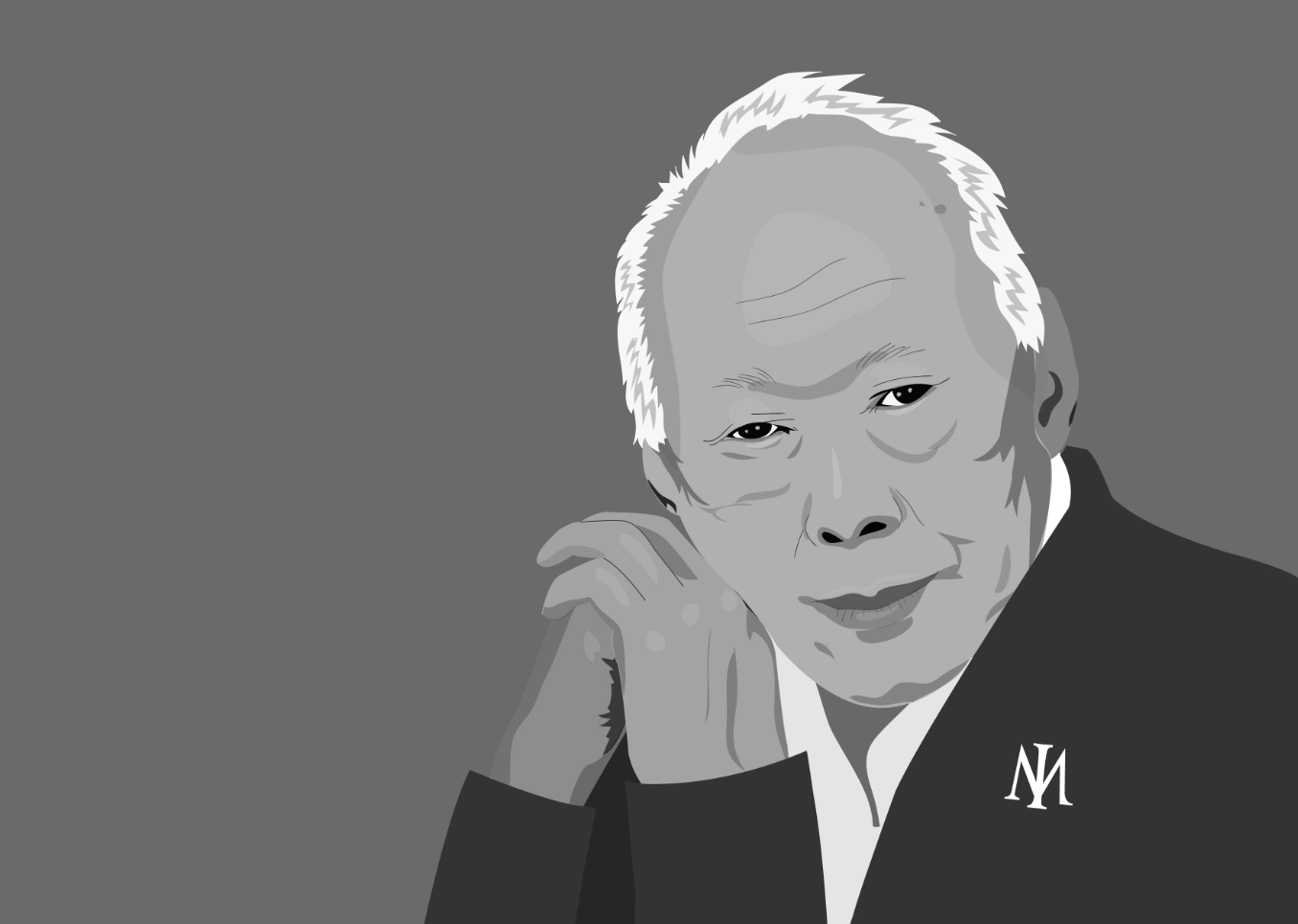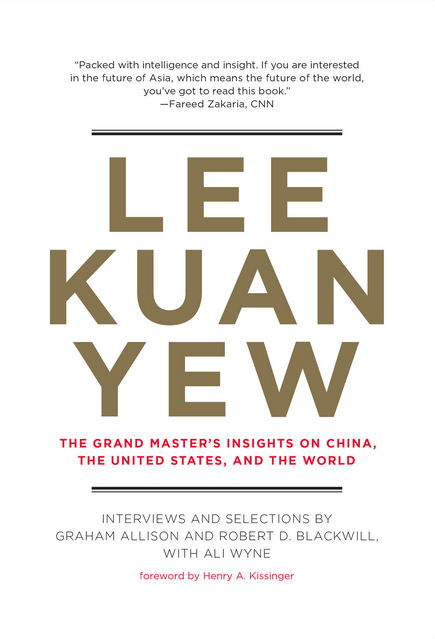“If you will make a study of the life and work of Lee Kuan Yew, you will find one of the most interesting and instructive political stories written in the history of mankind. This is better than Athens, this is an unbelievable history. And you will learn a lot that will be useful in life. Study the life and work of Lee Kuan Yew, you are going to be flabbergasted.” Charlie Munger
I often choose books to read from recommendations of the Investment Masters. I wanted to learn more about the late Lee Kuan Yew, the Prime Minister of Singapore for three decades, given Charlie Munger often praises him. Lee Kuan Lew took a swampland and turned it into a developed country in one generation.
The book 'Lee Kuan Yew - The Grand Master's Insights on China, the United States, and the World' gathers key insights from interviews, speeches, and Lee's voluminous published writings and presents them in an engaging question and answer format.
Lee Kuan Yew thought deeply about how to take Singapore up the ladder of economic prosperity and had incredible insights into how the world worked.
I was fascinated by the extent to which the lessons and insights of this great leader and his country overlap with those of great businesses and their CEOs. In many ways Lee Kuan Yew thought about, and ran his country, like a business. His thinking process mirrors many of the great investors.
It's a very easy book to read, I finished it over a weekend. I've included some of the more interesting observations..
China
"The Chinese have calculated that they need 30 to 40, maybe 50 years of peace and quiet to catch up, build up their system, change it from the communist system to the market system."
"I believe the Chinese leadership has learnt that if you compete with America in armaments you will lose. You will bankrupt yourself. So avoid it, keep your head down, and smile, for 40 or 50 years."
"China will inevitably catch up to the US in absolute GDP. But it's creativity may never match Americas, because its culture does not permit free exchange and contest of ideas."
"Technology is going to make their system of governance obsolete."
"[Not having English as a first language] is a serious handicap.. Talent will not go to China."
America
"The US is the most militarily powerful and economically dynamic country in the world. It is the engine for global growth through its innovation and consumption."
"Throughout history, all empires that succeeded have embraced and included in their midst people of other races, languages, religions and cultures."
"What has made the US economy preeminent is its entrepreneurial culture .. Entrepreneurs and investors alike see risk and failure as natural and necessary for success."
"In an era of rapid technological change, Americans have shown that those countries with the largest number of start-ups, especially in the IT sector, which venture capitalists finance, will be winners in this next phase."
"Many American practices go against the grain of the more comfortable and communitarian cultural systems of their own societies [the European and Japanese.]"
"The Americans have succeeded as against the Europeans and the Japanese because they have more extremes of random behaviour."
"America has a clear advantage over China, because its use of the English language enables America to attract millions of English-speaking foreign talent from Asia and Europe."
"Security, prosperity, and the consumer society plus mass communications have made for a different kind of person getting elected as a leader .. who can present himself and his programs in a polished way... From such a process, I doubt if a Churchill, a Roosevelt, or a de Gaulle can emerge."
"The US must not let is fiscal deficits come to grief."
"The world has developed because of the stability America established. If that stability is rocked, we are going to have a different situation."
America and China
"There will be a struggle for influence, I think it will be subdued because the Chinese need the US, need US markets, US technology, need to have students going to the US to study ways and means of doing business so they can improve their lot. It will take them 10,20, 30 years."
India
"India has wasted decades in state planning and controls that have bogged it down in bureaucracy and corruption'. The caste system has been the enemy of meritocracy."
"India has poor infrastucture, high administrative and regulatory barriers to business, and large fiscal deficits, especially at the state level which are a drag on investment and job creation."
"It is not one nation, but 32 different nations speaking 330 different dialects."
"India's private sector is superior to China's .. Indian companies follow international rules of corporate governance and higher return on equity as against Chinese companies. And India has transparent and functioning capital markets."
"The moment India has the infrastructure in place, investments will come in, and it will catch up very fast."
"India's system of democracy and rule of law gives it a long-term advantage over China, although in the early phases, China has the advantage of faster implementation of its reforms."
Singapore
"My definition of Singapore.. is that we accept that whoever joins us is part of us."
"[How did] Singapore make a living against neighbours who have more natural resources, human resources, and bigger space? How did we differentiate ourselves from them? They are not clean systems; we run clean systems. Their rule of law is wonky, we stick to the law. Once we come to an agreement or make a decision, we stick to it. We become credible to investors."
"I offered every parent a choice of English and their mother tongue, in whatever order they chose."
"The quality of a nation's manpower resources is the single most important factor determining competitiveness. It is people's innovativeness, entrepreneurship, team work, and their work ethic that give them that sharp keen edge in competitiveness."
"Standing still is a sure way to extinction."
"Our education system is being revamped to nurture innovation and creativity, from kindergarten to university, and on to lifelong learning."
"The internet makes markets more contestable, businesses in Asia must compete on this platform or be swept aside."
"Societies that succeed are those which easily assimilate foreigners. Silicon valley is such a place."
"For a modern economy to succeed, a whole population must be educated."
"We have to start experimenting. The easy things - just getting a blank mind to take knowledge in and become trainable - we have done. Now comes the difficult part. To get literate and numerate minds to be more innovative, to be more productive, is not easy. It requires a mindset change, a different set of values."
"Once established, like a language a society speaks, the habits tend to become a self-reproducing, self perpetuating cycle."
"In one generation (1965-1990) we made it from the third world to the first."
Developing Countries
"One 'X' factor remains a key differentiator, especially for developing countries; that is ethical leadership. A clean, efficient, rational, and predictable government is a competitive advantage."
Governing
"I learned to ignore criticism and advice from experts and quasi-experts, especially academics in the social and political sciences."
"If you want to be popular all the time, you will misgovern."
"One person, one vote is a most difficult form of government. From time to time, the results can be erratic. People are sometimes fickle. They get bored with stable, steady improvements in life, and in a reckless moment, they vote for change for change's sake."
"If everybody gets the same rewards.. nobody strives to excel; society will not prosper, and progress will be minimal."
"[The most common public policy mistakes are when leaders sometimes] succumb to hubris and over-confidence."
Thinking
"We may have conquered space, but we have not learned to conquer our own primeval instincts and emotions that were necessary for our survival in the Stone Age, not in the space age."
"We read many things. The fact that it is in print and repeated by three, four authors does not make it true. They may all be wrong."
"You must not overlook the importance of discussion with knowledgeable people. I would say it is much more productive than absorbing or running through masses of documents."
"I do not work on a theory. Instead I ask: what will make this work? If after a series of solutions, I find that a certain approach worked, then I try to find out what was the principle behind the solution."
"Our test was: does it work? Does is bring benefits to the people?"
"I do not believe that because a theory sounds good, looks logical on paper, or is presented logically, therefore that is the way it will work out. The final test is life."
"If you do not know history, you think short term. If you know history you think medium and long term."
"To understand the present and anticipate the future, one must know enough of the past, enough to have a sense of the history of a people."
"Do not try to impress by big words. Impress by the clarity of your ideas. I speak as a practitioner. If I had not been able to reduce complex ideas into simple words and project them vividly for mass understanding, I would not be here today."
"To create wealth, high motivation and incentives are crucial to drive people to achieve, to take risks for profit, or there will be nothing to share."
"Realism and pragmatism are necessary to overcome new problems."
"[Of all my Cabinet colleagues, Goh Keng Swee made the greatest difference to the outcome of Singapore ..] he had a capricious mind and a strong character. When he held a contrary view, he would challenge my decisions and make me re-examine the premises on which they were made. As a result we reached better decisions for Singapore. In the middle of a crisis, his analysis was always sharp, with an academic detachment and objectivity that reassured me."



